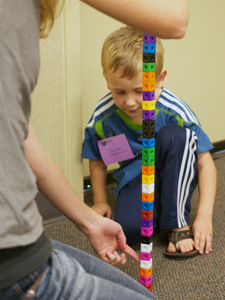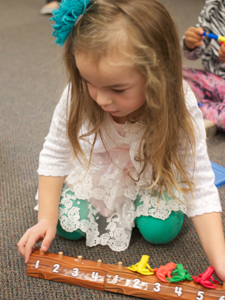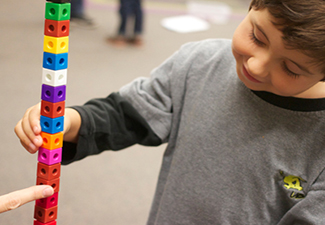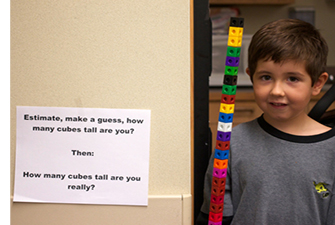Math
As schools put a bigger emphasis on S.T.E.M. (science, technology, engineering, and math), introducing early math skills to your child becomes more important. You can help your child with early math by making it fun and using numbers in everyday situations. Early math skills can include counting, number recognition, shape knowledge, sorting, patterning, one-to-one correspondence, and math vocabulary. Try these active learning ideas at home to boost your child’s early math skills.
Activities to try at home
Measuring tools
Sorting
Shapes
Count out loud
Count as you work
Write numbers
Board games
Measuring tools
Grab your measuring cups, spoons, and various-sized buckets and head outside to play with water. Use terms like “half,” “whole,” “more,” and “less” as you play with the water. Count out how many tablespoons you need to fill a cup of water. Estimate how many cups it will take to fill the different sized buckets. Ask questions like, “Did the ‘narrow, tall’ bucket hold more or less than the ‘short’ bucket?”
Sorting
Sorting objects by size or color helps children notice how things are alike and different.
Shapes
Help your child learn to identify and name shapes. Pick a shape and find the shape around the house. For example, search for rectangles and find them in doors, cereal boxes and books. Talk about how the shapes compare, saying things such as “the door is a bigger rectangle than the book.” Pick other shapes to find and compare.
Count out loud
Count out loud and count often. Sing songs that have counting in them such as “5 little monkeys” and recite nursery rhymes like “1, 2, buckle my shoe.”

Count objects
Have your child count out the number of napkins as they set the table or have them help you count as you measure ingredients for a recipe.
Write numbers
Write out numerals on a piece of paper and then count out small objects that match the number. This can help demonstrate that “5” is the same as “five”. Label the bottom of a muffin tin with written numerals and count out the specific number of objects.

Board games
Play simple board games in which your child must move a game piece a certain number of spaces depending on the roll of the dice. Create your own game by rolling dice and asking your child to do the same number of moves as appears on the dice. You can include movements such as jumps, spins, and steps.


